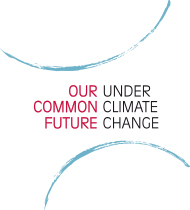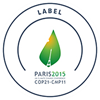* CFCC15 Scientific Committee:
��Chris FIELD (Carnegie Institution, USA) - Chair
� Philippe CIAIS (Climate Environment Society, France)
� Wolfgang CRAMER (Institut M�diterran�en de Biodiversit� et d�Ecologie marine et continentale, France)
� Purnamita DASGUPTA (Institute of Economic Growth, India)
� Ruth DEFRIES (Colombia University, USA)
� Navroz DUBASH (Centre for Policy Research, India)
� Ottmar EDENHOFER (Potsdam Institute for Climate Impact Research, Germany)
� Michael GRUBB (University College London, UK)
� Jean-Charles HOURCADE (Centre national de la recherche scientifique [INRA], France)
� Sheila JASANOFF (Harvard Kennedy School of Government, USA)
� Kejun JIANG (Nanyang Technological University, China)
� Vladimir KATTSOV (Main Geophysical Observatory, Russia)
� Herv� LE TREUT (CNRS-Universit� Pierre et Marie Curie, France)
� Emilio LEBRE LA ROVERE (National University, Brazil)
� Val�rie MASSON-DELMOTTE (Laboratoire des Sciences du Climat et de l�Environnement/Institut Pierre Simon Laplace, France)
� Cheikh M�BOW (World Agroforestry Centre [ICRAF], Kenya)
� Isabelle NIANG-DIOP (Institut de recherche pour le d�veloppement, Senegal)
� Carlos NOBRE (Centro Nacional de Monitoramento e Alertas de Desastres Naturais [Cemaden/MCTI], Brazil)
� Karen O�BRIEN (University of Oslo, Norway)
� Joy PEREIRA (University Kebangsaan, Malaysia)
� Shilong PIAO (Peking University, China)
� Hans-Otto P�RTNER (Alfred Wegener Institute, Germany)
� Monika RHEIN (University of Bremen, Germany)
� Johan ROCKSTR�M (Stockholm University, Sweden)
� Hans-Joachim SCHELLNHUBER (Potsdam Institute for Climate Impact Research, Germany)
� Robert SCHOLES (University of Witwatersrand, South Africa)
� Pete SMITH (University of Aberdeen, UK)
� Youba SOKONA (The South Centre, Switzerland)
� Jean-Fran�ois SOUSSANA (Institut national de la recherche agronomique [INRA], France)
� Mark STAFFORD-SMITH (Commonwealth Scientific and Industrial Research Organisation, Australia)
� Thomas STOCKER (University of Bern, Switzerland)
� Laurence TUBIANA (Institut du d�veloppement durable et des relations internationales, France)
� Diana �RGE-VORSATZ (Central European University, Hungary)
� Penny URQUHART (Independent analyst, South Africa)
� Carolina VERA (University of Buenos Aires, Argentina)
� Alistair WOODWARD (University of Auckland, New Zealand)
** International Council for Science (ICSU) President, Gordon McBean




